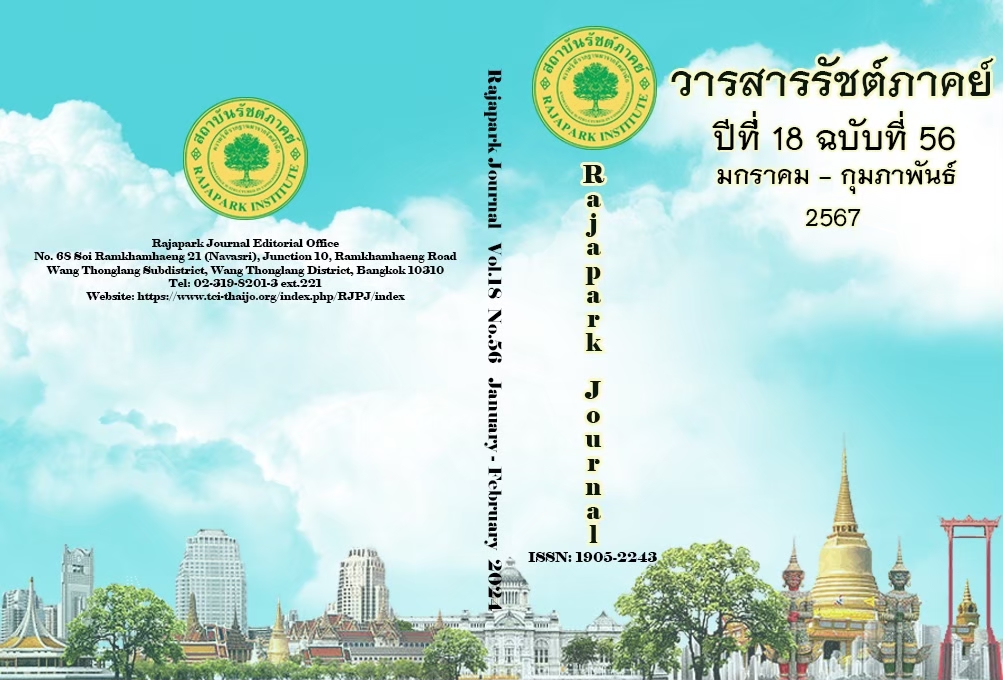The Role of Community Leaders in Promoting Sufficiency Economy Village: Case Study, Ban Den Ma Kham, Taluk Klang Thung Sub-district, Muang Tak District, Tak Province
Main Article Content
Abstract
The objectives of this research were to 1) investigate the role of community leaders in promoting self-sufficient community economies; 2) study the factors that promote the role of community leaders in promoting self-sufficient economies; and 3) explore the problems and obstacles to promoting self-sufficient economies among the population. This seemed to be a qualitative research study with a target group of 19 individuals, using semi-structured interviews to collect in-depth data. The data was analyzed using content analysis. The results of the research found that 1) the role of community leaders in promoting self-sufficient community economies is significant and can be divided into three levels: (1) the foundational level, in which community leaders act as economic models; (2) the challenging level, where community leaders provide knowledge and coordinate with villagers and relevant government agencies; and (3) the advanced level, where community leaders can develop the community and serve as knowledge disseminators to interested individuals. 2) The factors that promoted the role of community leaders in promoting self-sufficient economies were the involvement of villagers and government agencies from the beginning, as well as the community leaders' ability to be good examples, including their willingness to make sacrifices. 3) The problems and obstacles in promoting self-sufficient community economies include the misalignment between the actions of community leaders and government agencies and the genuine needs of the villagers, as well as the lack of sacrifices made by some community leaders.
Article Details

This work is licensed under a Creative Commons Attribution-NonCommercial-NoDerivatives 4.0 International License.
Views and opinions appearing in the Journal it is the responsibility of the author of the article, and does not constitute the view and responsibility of the editorial team.
References
Community Development District Office, Mueang Tak. (2022). Lessons Learned from Model Information Subdistricts for Improving Quality of Life Annual 2022 Subdistrict Taluk Klang Thung, District Mueang Tak, Province Tak. https://tak.cdd.go.th
Kaewlangka, T. (2013). The Role of Community Leader in Promoting Sufficiency Economy Philosophy. Nakhon Lampang Buddhist College's Journal, 2(2). https://so04.tci-thaijo.org/index.php/NBJ/article/view/251507
Klinubon, S. (2019). The Study of Participation of Community Contributed to the Success of Community Development Guided by The Philosophy of Sufficiency Economy at Banhuakhaojeen, Tambon Hoyyangtone, Paktor District, Ratchburi Province[Master’s Thesis, Silpakorn University].
Nakabut, A. (1993). Rural Learning Network System and Model. National Education Journal, 24(3), 29-46.
Nartsupha, C. (1997). Thai Culture and Social Change Movements. Chulalongkorn University.
Office of the National Economic and Social Development Council. (2006). The Tenth National Economic and Social Development Plan (2007–2011). Office of the National Economic and Social Development Council.
Office of the National Economic and Social Development Council. (2009). Sufficiency Economy Learning. Office of the National Economic and Social Development Council.
Phiansri, K. (2007). Philosophy of Sufficiency Economy According to The Royal Initiative and Solving Social Problems. https://www.m-society.go.th/ewtadmin/ewt/mso_web/article_attach/8939/11148.pdf
Raymond, J. B. (1972). Fundamental of Leadership. Yele University.
Sangsuwan, N. (2012) The Achievement of an Implementation of the Philosophy of Sufficiency Economy in Sufficiency-Economy-Based Model Villages in Chiang Mai Province[Master’s thesis, Chiang Mai University].
Senanarong, A. (2014). Agriculture According to the New Theory under The Royal Initiative. The Office of the Royal Development Projects Board (ORDPB).
Sub-committee sufficiency economy movement. (2007). What is Sufficiency Economy? (5th ed.). Office of the National Economic and Social Development Council.
Subhasaen, I. (2010) Roles of Tambon Administrative Organization Executives in Promoting Sufficiency Economy Way of Life: Case Study of Pah Bong Tambon Administrative Organization in Saraphi District, Chiang Mai Province[Master’s thesis, Chiang Mai University].
Sufficiency Economy Steering Committee, Ministry of Interior. (2006). Economic Village Sufficient Example. WVO Office of Printing Mill, The War Veterans Organization of Thailand.
Sukwirat, S. (1996). Localism and Regionalism in Thai Society. Institute of Public Policy Studies: IPPS.
Sornmanee, C. (2019). Documents for studying subjects Human Resource Development, Master of Public Administration, Ramkhamhaeng University. Ramkhamhaeng University.
The Chaipattana Foundation. (2017). Philosophy of Sufficiency Economy. https://www.chaipat.or.th/publication/publish-document/sufficiency-economy
Turisoth, T., & Suksan, B. (2019). The Approach Leadership Development for Self-Management of Leaders Community Organizations Council Changwat Buengkan. Udon Thani Rajabhat University Academic Journal, 7(1), 34-34. https://so06.tci-thaijo.org/index.php/UDRUAJ/article/download/240075/163600/823412
Wasi, P. (2001). Leadership in Society Thai and How to Remedy, In Leadership is Important to Thailand's Future. Matichon.
Wiboolsuk, S., & Kaemkate, W. (2009). Roles of the Boundary Partners in Supporting the Sufficiency Economy Philosophy in Vocational Institutions under the Office of Vocational Education: A Multiple Case Study. KKU Research Journal (Graduate Studies), 9(2), 141-153. https://ph02.tci-thaijo.org/index.php/gskku/article/view/24259


